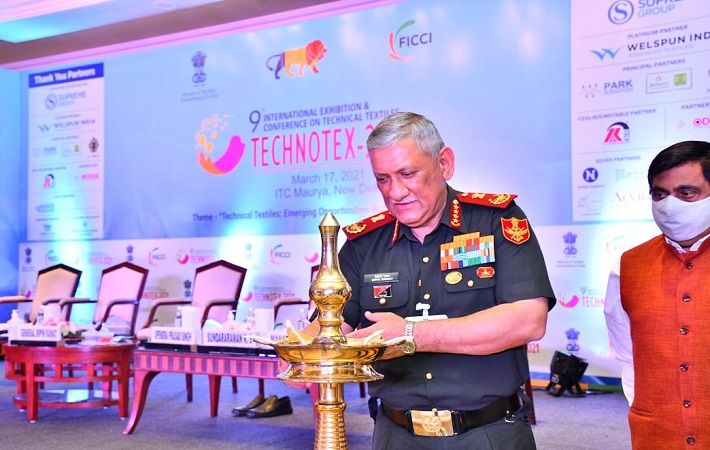Indian armed forces will completely ban import of clothing needed to sustain its soldiers at extreme temperatures if the domestic textile industry can innovate and manufacture them, according to chief of defence staff (CDS) General Bipin Rawat, who today said the forces have a huge stake in technical textiles and will continue to use them in the years ahead.
“We are looking at the kind of clothing that can sustain our soldiers in the kind of extreme cold climate (near northern borders of Ladakh) and in the hot, dry and humid climate in the deserts and the north-eastern regions where we have the jungle and semi-mountainous terrain,' he said in his speech at an event organised by the Federation of Indian Chambers of Commerce and Industry (FICCI).Indian armed forces will completely ban import of clothing needed to sustain its soldiers at extreme temperatures if the domestic textile industry can innovate and manufacture them, according to chief of defence staff (CDS) General Bipin Rawat, who today said the forces have a huge stake in technical textiles and will continue to use them in the years ahead.#
A substantial amount of clothing for the armed forces is being imported at present, but in the past one or two years, there has been a lot of innovation by the Indian industry as far as high altitude clothing is concerned, he said.
“We have now started placing orders for such clothing. And if we find that this thing can take off and support us, we will not hesitate in putting the entire clothing or the entire 'techno clothing' that we are using in the armed forces on the positive indigenisation list, which we were earlier calling the negative list for imports,” Rawat said.
“This means we will completely ban the import of these items and make sure that the defence services have to depend only on the Indian industry as part of our Atmanirbhar Bharat support that we wish to give to the industry,” he said.
The government in August last year announced a 'negative list for imports' that restricted purchase of 101 defence items like light combat helicopters, transport aircraft, conventional submarines and cruise missiles from foreign entities.
“We are hopeful that the ministry would help us, the techpreneurs in the field would help us with the kind of textiles we are looking at”, said Rawat.
“Not only we require clothing for hot and cold climates but clothing that can help identify friend from foe when there is close proximity between soldiers, clothing that has specialised parameters, special markings, which when we look at through binoculars or some instrument, it will reflect differently if they are being worn by own troops or adversaries. We would be able to identify when to shoot and fire,” said Rawat.
A space agency has been created under CDS. Technical textiles can be used in space applications in the kind of clothing needed to enter space, he said. There can be clothing that are insect repellent so that soldiers in the Northeast don’t have to wear nets, he said.
Technical textiles can play a role here in making the clothing and equipment of a soldier lightweight, he added.
Fibre2Fashion News Desk (DS)


